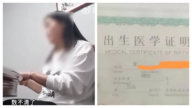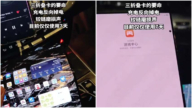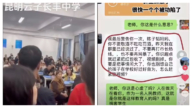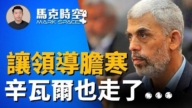【新唐人2013年09月28日訊】大陸最新發佈的《藍皮書》指出,新媒體的發展使得中共當局的公信力受到了巨大影響,大陸民意表達出現了「信網不信黨」的現象。因此《藍皮書》建議當局加大宣傳和傳播力度,加強網路輿論陣地建設和監管。對此,評論認為,藍皮書的真實意圖是在為中共近期的網路打壓運動尋找合法理由,否則這場備受國際社會譴責和全民反對的所謂「淨網」行動將難以為繼。
中共喉舌《中新網》報導,9月26號,北京國際城市發展研究院與社科學文獻出版社,聯合發佈了2013《社會管理藍皮書》。報告中指出,中國在城市化進程中,出現了十大亟待解決的發展難題,其中包括虛擬社會管理問題、民意訴求渠道問題、如何塑造政府公信力問題、流動人口問題等等。
在談到關於當前大陸民意訴求表達的特點時,《藍皮書》指出,通過對近年來發生的熱點輿情事件的分析看到,民意訴求表達有時已陷入一種「信上不信下、信鬧不信法、信網不信黨」的怪圈。對此,民眾則表示,上述現象的始作俑者恰恰是中共自身。
大陸權利運動家胡軍:「我們現在還不是說的『信上不信下』的問題了,現在就是徹底中共就沒有任何信可言了,上訪可以這樣說,它不是說他信上面,而是說他沒有其他的途徑,來表達這種訴求。 還有說一個『信法』的問題,中共它本體制就是一個踐踏法律的體制,特別是夏俊峰的案子我們可以看到,它就是對中國平民百姓進行殺戮。」
受訪者認為,中共當局的官官相護、司法黑暗,使得民意訴求通道嚴重受阻,逼迫百姓不得不通過逐級上訪和街頭維權傾訴冤情,而最受民眾歡迎的方式就是通過互聯網來曝光、舉報貪官惡行。
胡軍:「每一個人都可以在網上表達個人的意願,它剛好對獨裁體制有個致命的解體,造成這個獨裁體制的謊言徹底破滅,所以大家都希望通過網路把自己的苦難、把自己的想法、把自己的怨氣告訴大眾、告訴世界。」
《藍皮書》還提出,互聯網、新媒體的快速發展,使「輿論領袖」與「網路推手」作為草根階層快速崛起,社會共識的底線被調整,這些變化給政府公信力帶來了巨大挑戰。
原河北廣播電臺編輯朱欣欣:「真正的關於公共事務的一些傳言、謊言的流行啊,跟本上要解決這個問題,那首先是政府的政治體制運作的公開透明,必須做到這一點,同時還要做到公平、公正。官方很多做法缺乏透明、缺乏公正,那老百姓就相信所謂非正式渠道的,民間的傳言和流言,這是必然的。」
此外,《藍皮書》說,要提高政府公信力,就要推動有效的傳播和引導性的宣傳,重新塑造政府公信力。而這種說法同樣遭到了民間的駁斥。
朱欣欣:「中國的輿論一直缺乏規範性和正常性,就是和官方操縱輿論有關係,它越操縱,老百姓越是不相信它們,它們這個體制運作越不公開透明,老百姓就越相信這些傳言。 只要存在官方的壟斷,它對言論的壟斷、對輿論的壟斷,那百姓就不會相信官方的種種宣傳和說法。」
在談到虛擬社會管理問題時《藍皮書》強調,網路輿情環境是虛擬社會的第一環境,輿情信息內容事關現實社會的和諧與穩定,因此建議政府加大監管力度,完善網路立法,加強虛擬社會輿論陣地建設和輿情引導機制。
評論指出,《藍皮書》這番言論的根本目的,是在為備受法律界詬病的「兩高」網路言論司法解釋,和中共全面緊縮網路輿論自由,尋找合法藉口。
採訪編輯/ 張天宇 後製/蕭宇
China’s Blue Book: People Trust The Internet
Rather Than The Communist Party
China’s latest Blue Book said that the development
of social media affects the regime’s credibility.
In Mainland China, people would rather trust Internet
information than the Chinese Communist Party (CCP).
The Blue Book suggests the regime strengthen propaganda
work and control of public opinion on the Internet.
Commentators said that the Blue Book is trying to
find excuses for recent online suppression.
If not the so-called “online cleaning out" campaign which is
condemned by international society and the entire nation
will be hard to continue.
The regime’s media China News reported on Sept. 26, Beijing
officially published the 2013 Blue Book of Social Institution.
The report listed 10 urgent issues that need to be resolved
in China’s urbanization process.
It includes social management, channel for public appeal,
regime’s credibility, floating population and other issues.
Regarding characters of public opinion, the Blue Book said
from what had happened in recent years that sometimes,
the public fall into a circle “rather rely on higher authority to
solve problems;
They rather believe in violence than the law.
They rather believe online news than the CCP."
Regarding these points, people said the CCP is the main cause.
China’s activist Hu Jun: “We are not talking about not trusting
a higher authority, actually the CCP is completely untrustworthy.
People try to appeal to a higher authority; it doesn’t mean they
trust them, but there is no other way for them.
Regarding the law, the CCP is violating it. With Xia Junfeng’s
case we know the law is a tool for killing Chinese citizens."
Hu said the CCP officials help each other. The judiciary is
corrupt, peoples’ appeals are blocked everywhere.
Civilians have to appeal to higher authority step by step,
or protest in the street for their mistreatment to be heard.
Now the most popular channel is via the internet
to expose corrupt officials.
Hu Jun:"Anyone can express their wishes online.
It is just the right way to collapse the CCP dictatorship.
It causes the CCP’s lies to shatter, people use the social
networks to share their hardships, ideas and complaints."
The Blue Book said that the social networks and
social media developed very fast.
It made big bloggers and online promoters rapidly
grow from a low class.
The bottom line of social consensus is adjusted.
All these changes have brought great challenges
to the regime’s credibility.
Zhu Xinxin, former editor of Hebei Radio Station:"To get to
solve the problem of 'spreading rumors' about social affairs,
the regime must operate transparency. They must achieve this
point, meanwhile they need to be fair and equitable.
Now officials lack transparency and fairness in many practices.
People can only trust informal channels,
such as rumors and gossips, it is inevitable."
The Blue Book also said to improve the regime’s credibility,
it needs to develop effective channels and guide publicity to
build up its credibility again. However, these words were
refuted by the public.
Zhu Xinxin:"Chinese public opinion lacks standards and
formality. This relates to the regime’s manipulation.
The more the regime manipulates, the less people will believe it.
The more opaque the CCP system the more people will believe
in rumors.
As long as the regime’s monopoly exists, and it controls public
opinion and expression, people won’t believe the propaganda."
Regarding virtual community management, Blue Book stressed
that online expression is the first virtual community environment.
Online information content relates to the society’s harmony and
stability.
The Blue Book suggests the regime strengthens supervision,
improves Internet legislation, and strengthen the development
and guidance of the public opinion aspect.
Commentators point out that the purpose of the Blue Book is
trying to find a legal explanation and excuse for the recent
suppression of online expression.





























